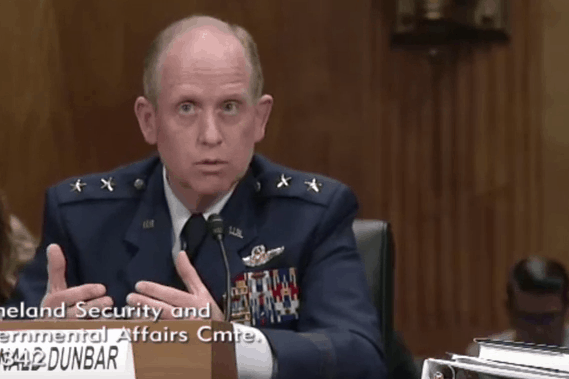Wisconsin Electrical Grid in the National Spotlight

Major General Dunbar explained the difference between a typical power outage and the type that can be caused by the threats discussed in the hearing.
“The scale we are talking about, we don’t have plans. We are trying to get our head around what that would look like. (It’s) the very point my colleagues on the panel are making. It’s one thing to have a power outage for a couple of hours. I joke with my wife that it’s almost romantic. You light a candle. It’s not going to be romantic after a month. It’s going to be a bad day, a bad week, a bad month.”
The Major General asked the committee to imagine mass evacuations if people in major population centers had to leave their homes due to lack of water.
On May 18th, The Wisconsin Adjutant General, Donald Dunbar, testified before the Senate Homeland Security Committee on the ability of the Wisconsin National Guard to respond to a large scale long term black out due to a failure of the electrical grid. According to the panel of witnesses, such major black outs can be caused by large solar storms, cyber attacks, physical attacks on electrical substations, and asymmetric nuclear EMP attacks which nations like Iran, North Korea, Russia, and China are all currently capable of. General Dunbar testified along side Ted Koppel, author of the book, Lights Out: A Cyberattack, A Nation Unprepared, Surviving the Aftermath, and the primary electrical utility industry lobbyist representing the self-regulating trade association Edison Electric Institute, Scott Aaronson.
Mr. Koppel’s testimony, research, and skepticism raised serious questions about the claims by the industry representative, Mr. Aaronson, and those of the government that the nation is prepared for the threats to the electrical grid or for the management of emergencies that can result from its failure. General Dunbar’s testimony strictly addressed the role of the Wisconsin National Guard.
Major General Dunbar’s key points were that:
- The Wisconsin National Guard’s top security priorities for protecting the electric grid are cyber security, asymmetric terrorist threat, catastrophic incidents, and capability sustainment.
- States are not often a part of the information sharing needed for electrical grid security that takes place between industry and the Federal government. States should have a greater role. The Wisconsin National Guard initiated an information sharing agreement on physical security after learning of the 2013 attacks on the California Metcalf station which the industry had covered up for over a year.
- A primary concern in the event of a long term black out is to ensure water and sewage operations so that citizens would not have to leave their homes and compound a catastrophic event with mass migration. Water and sewage operations would, in such an event, depend on diesel fuel which only lasts a finite amount of time.
- Major General Dunbar observed that Ukraine was able to switch to manual back up control operations when a Russian cyber attack took down their grid. The U.S. is far more dependent on Smart Grid internet based controls. Over dependence on such systems that have largely phased out old fashioned manual controls makes U.S. electrical utilities more vulnerable the the Ukrainian electric grid to cyber attack.
- The National Guard does not stockpile food. Availability for food supply can end abruptly as our normal system depends on normal transportation conditions.
- Coal is essential to national security as a way to restart the electric grid if a major event occurs. There should be accounting for the strategic security value of coal as politics move us away from it as a primary source of energy.
